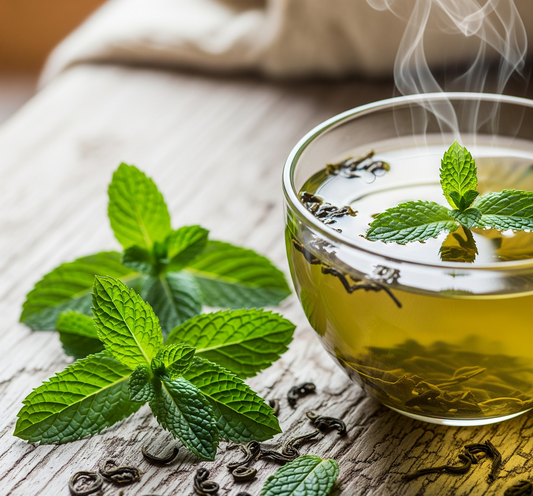Making the switch from coffee to any other beverage, even one as delicious and popular as tea, is not easy. If you’ve tried to make the switch over and over again and still failed, we completely understand. In this blog, we’ll offer you some tips on mentally and physically managing your coffee withdrawals and successfully making the switch to tea.
There are three steps to switching from coffee to tea. First, you must identify why it’s so difficult to quit coffee, identify the ways in which coffee is harming you and figure out why you want to make the switch, and finally, find the perfect alternatives for your coffee habits. Here we go:
Why Are You Addicted to Coffee, and How to Begin Making the Switch to Tea:
We have to face the facts: We’re hooked on coffee because we love coffee. Coffee is delicious: Dark, rich, good with ice, good with milk, and good as a nice, cool, tall iced latte – no matter how cold it is outside.
Another reason why coffee is difficult to ditch in favor of teas is because of our lifestyles. The high octane caffeine kick that coffee gives us gets us up, out of the house, and zipping through the fast-pace of our contemporary lifestyle. We work long hours, and caffeine kicks give us the mental stimulation and physical surge of energy that keep us going.
Our need for caffeine kicks eventually keeps us in a vicious cycle of needing caffeine. Though you might feel as though coffee gives you the energy to start your day – coffee’s association with energy is actually pretty counter-intuitive.
Drinking coffee everyday can keep your energy levels very low. This is because coffee interferes not only with your sleep cycle and your circadian rhythm, but it also messes with your hormone levels, your appetite, and your ability to absorb key nutrients like iron – all important in naturally regulating your energy levels.
So if you’re waking up tired regardless of how much sleep you’re getting, if you wake up nauseous and not wanting to eat breakfast, if you experience afternoon slumps and crashes, and if you’re unable to sleep well into the night, and if you struggle with chronic low energy levels, giving up coffee is the first step to getting your energy levels back to your baseline.
Having your “why should I make the switch from coffee to tea” clear is the first step of actually making the switch.

What Happens When You Quit Coffee: Benefits of Switching from Coffee to Tea
Switching from Coffee to Tea can help you turn our routines inside out. Here’s what detoxing from coffee can do for you:
Improved hormone health:
Drinking coffee first thing in the morning on an empty stomach has been linked to high levels of the stress hormone cortisol.
While some amount of cortisol is released by our body while waking up, extremely high cortisol levels are said to have adverse effects on the body, suppressing appetite and interrupting women’s hormone cycles.
In recent years, having a steady and regular hormone cycle has been linked to good energy levels for women. Dieticians advice that before you reach for a cup of coffee, which releases a large amount of caffeine into your bloodstream, you should eat a healthy and balanced breakfast to reduce the amount of stress you put your body through.
Switching to tea from coffee can reduce the amount of caffeine that enters your bloodstream first thing in the morning. The caffeine in tea is released slowly over a few hours, giving you a gentle and sustained energy boost through the day. Additionally, the compound L-Theanine present in tea has the action of calming you down, keeping you steady and alert without the caffeine jitters.
Reduced Anxiety:
The huge load of caffeine in coffee has been associated with jitters, high stress levels and anxiety. Interrupted sleep cycles, low appetites and the constant caffeine rush, jitters and eventual crashes can also cause a lot of anxiety in our body.
The trick is to reach for slow release caffeine, which you can get from tea. As mentioned previously, tea’s L-theanine amino acids are also prized for its calming and soothing properties, giving you mental clarity and physical groundedness while also giving you a little caffeine boost.
Better Appetite:
The caffeine in both coffee and tea can cause a suppression of your appetite, especially in the morning. While this might not be a problem for everyone, breakfast is said to be an important meal for people who have menstrual cycles and long hormone cycles.
It’s important to keep stress levels in the body low, and to do that, our bodies require frequent, nutritious meals. Coffee and some teas can not only suppress your appetite, but can also inhibit the absorption of iron and minerals like magnesium, which is an important mineral in regulating sleep and gut health.
Our best advice is to wait an hour or two after your meals before you have a cup of coffee, or switch to a lighter tea, which releases its caffeine slowly.
Better Sleep:
It goes without saying that quitting coffee will help you sleep better. If you switch to a herbal sleepy time tea, even better.
Sleep is one of the main reasons why people want to quit coffee and switch to tea. Long periods of caffeine induced insomnia can be very stressful for the body, and can be very mentally taxing. Sleep is also associated with our overall health: mental health, hormone health, gut health, and overall energy levels.
The best thing to do for our sleep, along with getting sunlight, proper nutrition, and proper sleep hygiene, is to cut out caffeine later in the day. You don’t necessarily need to completely switch to decaf herbal teas – but go for a slow-release, well made tea.
Orthodox teas, which are often high grade and crafted to contain a lot of flavonoids and bioactives, have a long-lasting and low-grade caffeine effect on your body. This means that you won’t be reaching for a caffeine-packed cup of coffee in the afternoon, which is guaranteed to keep you up past midnight!
Sustained Energy Levels:
Better nutrition, hormone health and a regulated sleep cycle that comes with switching from coffee to tea will ensure that you have a better baseline energy level.
This means that you won’t wake up tired, and will not need to reach for a cup of coffee to start your day. Because you don’t start your day with coffee, you won’t experience the afternoon caffeine crash that keeps you trapped in the cycle of drinking coffee late in the day, not being able to sleep until late in the night, and waking up tired, therefore needing to reach for a cup of coffee.
You can break this cycle starting today by reaching instead for a wholesome cup of loose leaf, high-grade teas. We’ll give you some recommendations:
Make Switching from Coffee to Tea Easy With Black Tea:
If you’re making a switch from coffee to black tea for any one of the various reasons to take such a drastic change– to brew a perfect black tea is crucial to enjoying a cup on your own.
Strongest of all kinds of tea, black tea is often times the crowd-pleaser. With it's darker, richer and bolder flavors, black tea is the perfect first step to switch from coffee to tea. The key to sticking to black tea is knowing how to brew black tea properly.
When we pour hot water over tea leaves, the dried leaves slowly release an array of colors and flavors into the cup. This process of soaking tea leaves in water is known as steeping. It’s an infusion of water. When the hot water contacts the tea leaves, nutrients are extracted from them and launched into the water.
This early exposure to an intense environment results in black tea being nearly impossible to brew wrong. Hot water while usually tend to ruin the taste for the more delicate teas like green and white teas, only strengthens the flavors for black teas. Black teas can also withstand a longer infusion time.
Making Switching to Tea From Coffee Fun: Exploring a Variety of Flavors.
Just like coffee, with it's different levels of roasting, different origins and variety of flavor notes, tea also comes in a variety of oxidation levels, roasting and drying techniques, terroir varieties, and rich, complex flavors.
Start your journey with an exploration of our catalogue.
- Kumari Gold
- Kanchanjangha Noir
- KTE #1
- Baraha Black
- Golden Needles
- Kaalo - Special Black
- KTE Muscatel

Brewing Black Tea to Beat your Coffee Craving:
You can brew black tea by using either the standard western method or eastern brewing technique. Some teas are more suitable for regular brewing, while others may reveal exceptional notes only when brewed multiple times. Both steeping time and water temperature will influence how many cups of tea you will get from loose leaf teas.
Follow the following instructions for best results on Nepali black loose leaf teas
- For best flavor, filtered water to a boil (210℉).
- Preheat your vessels by pouring some hot water into it, and then discarding it.
- Measure your tea leaves. We recommend using 1 teaspoon of loose leaf tea for every 8 ounces of water.
- Place your leaves in the teapot and pour 8 ounces of boiled water directly over the leaves.
- Ensure all the leaves are soaked
- Allow the leaves to steep for 5 minutes.
- After 5 minutes, place our foldable tea strainer in your cup and pour the tea.
- Serve the contents of the teapot and enjoy.
Note*- You can re-steep good loose leaf teas like all the black teas in our collection. Second steep usually brings out softer flavors and colors.
2 grams of black tea will be enough for a great-tasting cup. Nepal Tea Collective recommends 2 grams for every 8 oz of water.
Few things to keep in mind while brewing loose leaf black tea
- Use less leaves
With loose leaf black tea, one teaspoon will almost always be enough. The leaves will have enough room and time to expand freely in the pot. Adding too much leaves will constrict the opening of dried leaves and your brew will not be as flavorful.
- Clean the vessel afterward
Black tea stains are near impossible to clean. So clean whatever vessel you’re using immediately by hand.
- To understand the natural deliciousness of any brew, it is essential to try the tea without sweeteners. We encourage you to let the tea in all its natural sweetness win your over. But if you want to add milk or sugar to your brew, don’t do it directly to the teapot. Add them to your own cup according to your preference.
- Use double the amount of leaves for iced tea
For making black iced tea, use more leaves than for a regular cup of hot tea. Otherwise, flavor will get lost easily.
Enjoy your journey to better energy levels, and change your daily routines one sip at a time!
We hope this was helpful in your journey of switching from coffee to tea. Our final tip would be to take it slow and easy! Make your switch from coffee to tea fun by exploring the range and varieties of teas out there, all with different flavor profiles, caffeine levels and a range of health benefits.




